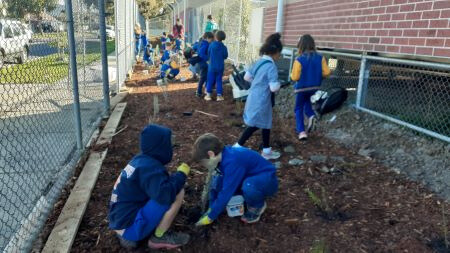There was an unusual sight at Newlands Primary School one chilly morning in June: dozens of Grade One and Two students carefully planting seedlings in a narrow strip of land along Murphy Street.
Working with quiet focus despite their excitement, the children moved expertly through the steps they’d learned: checking the plants’ root systems, packing soil, laying mulch, and gently watering the seedlings once they were settled in the earth. The activity was part of a broader project to transform neglected areas of the school grounds into a thriving indigenous habitat corridor and wellbeing garden.
 Students from Newlands Primary School planting.
Students from Newlands Primary School planting.
Guided by teacher Nerida Jolley, and with sustained support from Merri Creek Management Committee (MCMC) environmental educator Dr Angela Foley, the students undertook their planting during Waring – the Wurundjeri Woi-wurrung season of cold, wet days, when conditions are just right to take advantage of mid-Waring rain and cool temperatures.
Also coinciding with World Environment Week, the project was the latest example of how MCMC’s long-running Learning Grounds program helps connect young people with local landscapes, environmental action, and to recognise Wurundjeri Woi-wurrung Country’s seasons, plants and animals.
Nerida is a community inquiry specialist at Newlands Primary, who works to help students engage with the world around them, and she says the support from MCMC was vital.
“To get expert advice for both educational purposes and indigenous landscaping is invaluable,” she said. “In public schools we’re always running on limited budgets and time, and much of what I’ve done with my students over the past 18 months would have been out of reach without Darebin Council’s support of MCMC.”
With Angela’s help, Nerida successfully applied for a $5,000 Landcare grant, which funded the planting of a swale, the creation of an indigenous habitat corridor along Murphy Street, and a nature-connected wellbeing garden. A separate grant from Darebin Council funded an excursion and supported MCMC’s Learning Grounds program on caring for waterways.
Angela, who’s been running school-based indigenous garden projects with MCMC for more than 20 years, said the students’ enthusiasm and care were inspiring.
“They get really involved and proud,” she said. “Even though these are young students in the early grades, they learn how to plant properly, how to treat the seedlings gently, how to mulch and water. They’re so careful and on task. I teach them exactly the same steps I use with Year 12s – and they get it.”
Preparation for the project was extensive, involving site visits, classroom incursions, parent working bees and collaboration with the school’s groundskeeper, Rhenny Kemp. Angela praised Rhenny’s openness and practical contributions, including drilling hundreds of planting holes in a narrow, debris-filled space between buildings and the footpath.
“The area had been left pretty bare after building works – just rocks, rubble and weeds,” said Nerida. “It’s where most families walk past every day, so it felt really meaningful for the students to turn it into something beautiful.”
In line with Wurundjeri seasonal knowledge, the students learned about Waring and the importance of timing their planting to give the seedlings the best chance of survival. Where possible, they also learned the Woi-wurrung names of some plant species.
Eco-literacy, Angela says, is central to the program.
“We’re helping children to recognise Wurundjeri Country and build a language and understanding for the ecosystems they live in, and helping them become future advocates for places like Merri Creek and its catchment.”
Grade Three and Four students also attended an excursion to nearby Edgars Creek, where they observed freshwater animals and explored how stormwater flows from school drains to local waterways. These sessions inspired follow-up activities, including multilingual posters created with the Spanish Club, and discussions about how to reduce litter and protect waterbugs, eels and other wildlife.
With three distinct new garden areas now established in the school, and a student gardening club taking on long-term care, the project is set to leave a lasting legacy.
“Students have loved the hands-on nature of it,” said Nerida. “They’re doing something practical to make a difference – and they’re going home talking to their families about indigenous plants, about the difference between native and indigenous species, and how we can all care for Country. It means a lot to know that we’re giving the plants every success of thriving thanks to the advice and support of MCMC.”
 Student drawings, Newlands Primary School.
Student drawings, Newlands Primary School.





 Merri Creek Management Committee. 2 Lee St, East Brunswick, Victoria, Australia 3057
Merri Creek Management Committee. 2 Lee St, East Brunswick, Victoria, Australia 3057